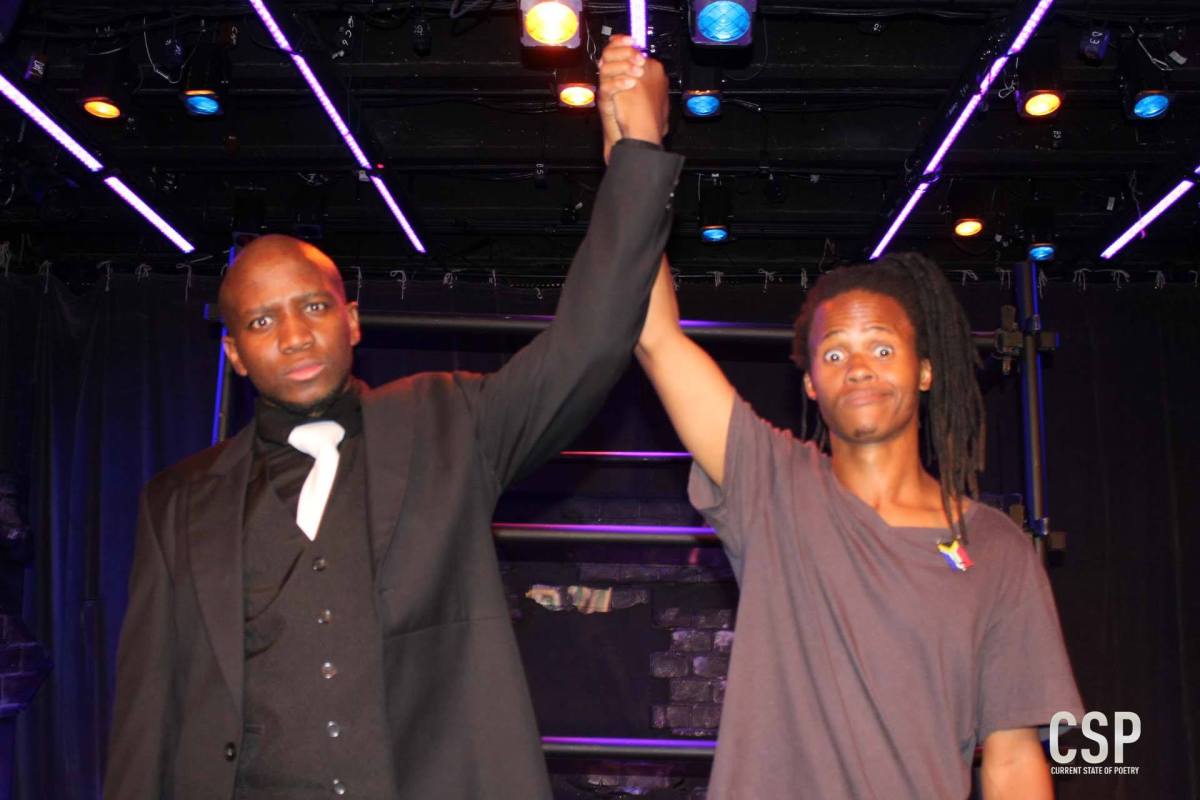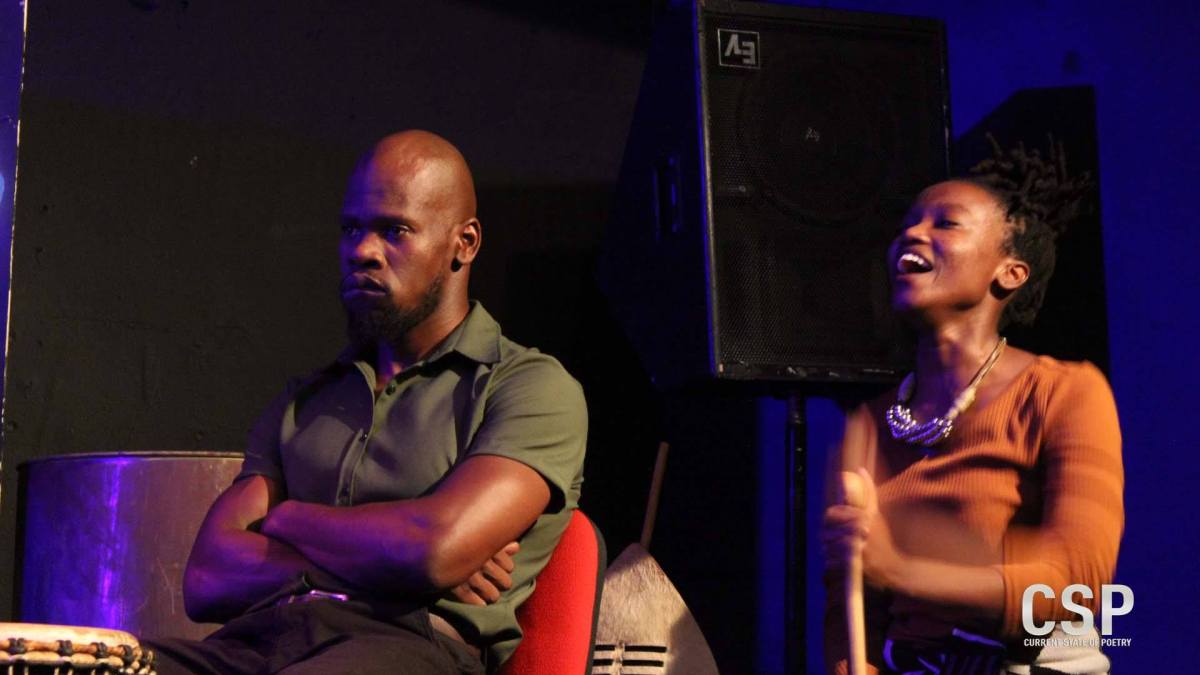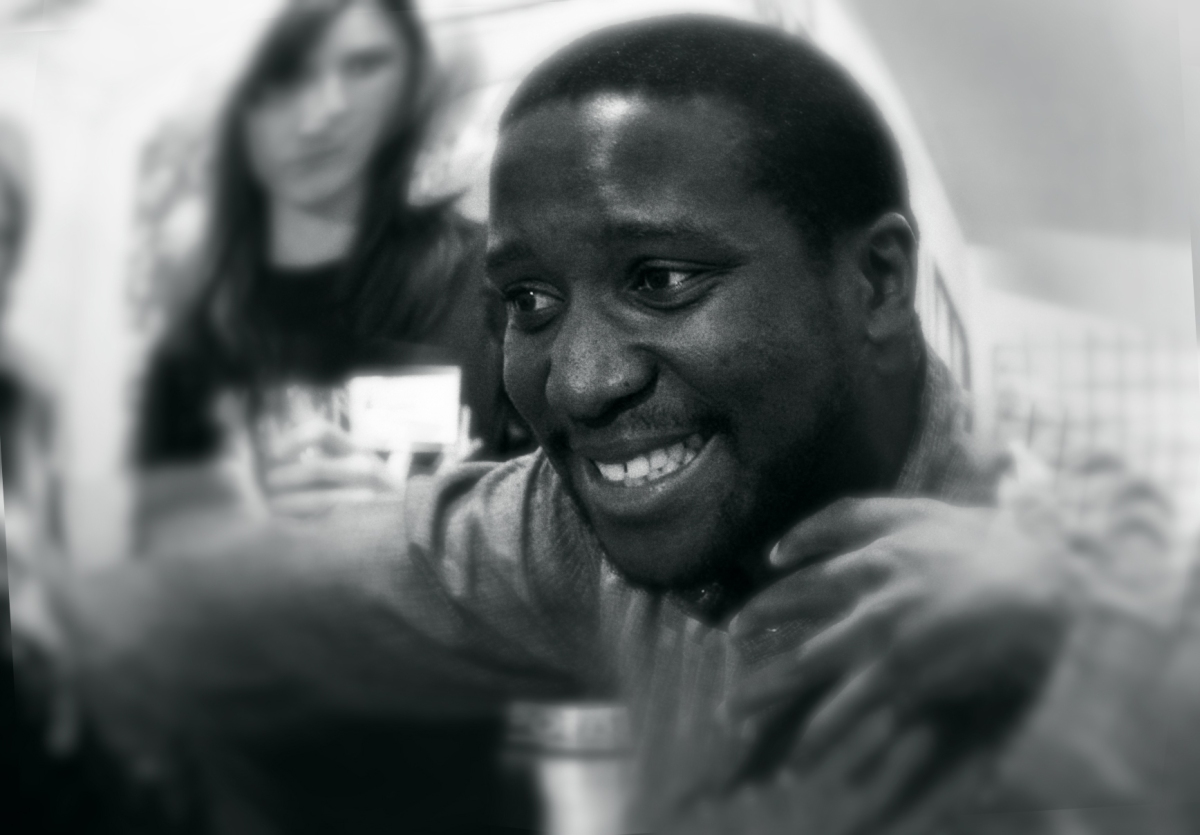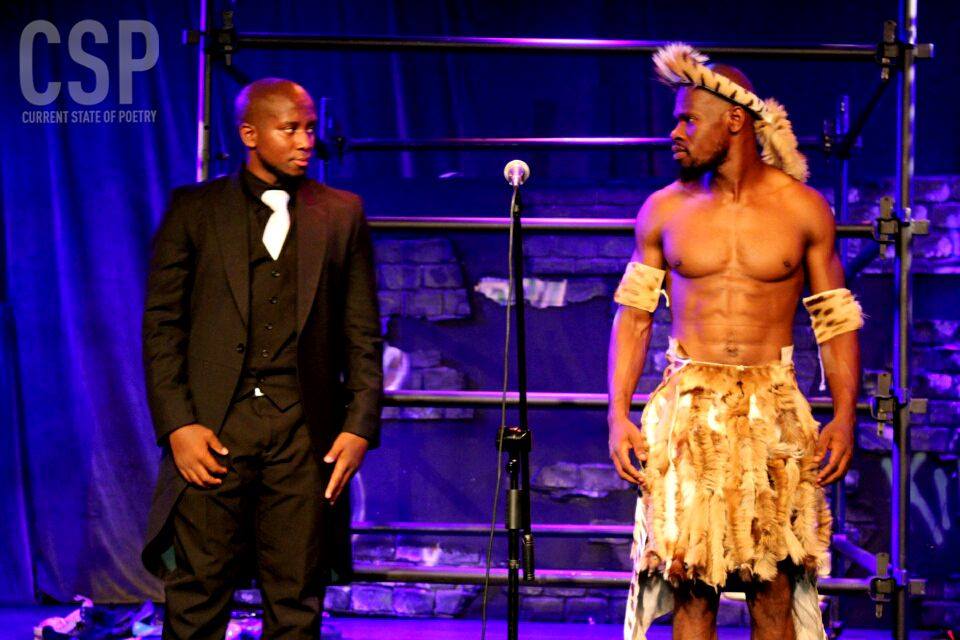
Writes Ziphozakhe Hlobo
“The third round came after two flawless rounds (No judge, including the audience, had favoured Ingonyama).
If you were at the slam, you will remember that Ingonyama, just before I said a single word of the third round poem, beat his drum. This is reason enough for me to believe that Ingonyama may be using witchcraft. CASE CLOSED.”
Poet, actor and filmmaker, Zéwande Bk. Bhengu, takes time to reflect on the One-on-One Current State of Poetry SLAM, which he won against Durban’s contender, Khulani “Ingonyama” Maseko. A slam in which all Malangabs were brought to play, the panel of judges included Bobby Gordon, Zoya Mabuto and, of course, the audiences.
Born and raised in a rural area called Redoubt in the Eastern Cape, Zewande reminisces about how the entire journey to poetry began for him.
“When I was younger,” he begins, “I was sketching, and my weapon of choice was the pencil. Because of how slowly information reaches the rural areas and how that then translates to a lack of knowledge of the broader world, I was called an artist. So, I really thought that being an artist meant you were in fine arts (Panting, sketching).”
It was only when he got to grade 6 that he wrote his first poem EVER for English class, but unfortunately, his teacher told him that he plagiarized, so he failed that project.
“I went home and reported to my mother who was a lot calmer about the whole thing than I was and all she really said was: “Write another one”. I wrote another one and after that one she said: “Write another one.” So I suppose I am where I am in poetry because I listened to my mother,” he says.
Zipho: So, CSP happened on 06 February and you took the title with tough competition, what was the most enlightening moment of the entire thing for you?
I think the one aspect that really left me awe-struck was certainly the hype around the One-On-One Slam and particularly the week before the performance. It felt as though we were going to war or (as so blatantly expressed by a comparison poster), a boxing match and people were unapologetically standing behind who they believed would win the slam. I don’t think I have encountered a One-On-One slam that has generated that much hype behind it. With all the messages that I was receiving and the commentaries in people’s social media updates, I was inspired to be best I could be to meet and exceed expectations. Essentially, the audience was the best part about The Current State of Poetry Slam (#CSPSlam) for me.
Zipho: Take me through the rehearsal process you went through for this particular slam….
I had been preparing for the slam for about 2 weeks. It was nothing but going over and over my poems and trying to find the best way to perform each one of these poems. The time limitations were a huge factor in my rehearsing because I had to rehearse with a timer, especially for the first and third round. I rehearsed and rehearsed them. I got to a point where I was very comfortable with all of the first three poems and I was still a tad thrown by my last poem.
Zipho: at some point during the slam, you fluffed your words and it looked like you were about to be smashed by Ingonyama, what did that feel like?
Well, 2 things.
One, the irony now is that looking back, I think I might have been too comfortable with my poems and I may have done them an injustice of not paying enough attention to their performance, which is inexcusable. At the moment of the ‘fluff’, I really thought I had lost the whole slam. For me, I was disappointing everyone who was there to support me and I was disappointing myself. For that moment, I was extremely fearful of what that one round could possibly mean to my poetry career. That is the last thing I wanted any one to go home remembering.
Two, the third round came after two flawless rounds (No judge, including the audience, had favoured Ingonyama). If you were at the slam, you will remember that Ingonyama, just before I said a single word of the third round poem, he beat his drum. This is reason enough for me to believe that Ingonyama may be using witchcraft. CASE CLOSED.
I am being facetious. What did it feel like? I wanted to find a deep hole and climb inside it but I had to soldier on and I want to believe that I had a relatively good turn around. And the last poem was the one I was actually nervous about and it took me by surprise as well.

Zipho: You had a great come back indeed. So, what did you learn from that moment?
Because so much was going through my mind at the moment of the ‘fluff,’ I had to quickly and swiftly calm down and let go of what had just happened, but focus on what had to happen next in order to secure my win. I had to find a space in my head to calm down and release that heaviness. I learned the importance of breathing, taking a step back when I need to. I learned to leave my ego off the stage and to never be too comfortable.
Zipho: one of the scariest things about the work you do for me is just how much people put you on a pedestal and feel entitled to every aspect of you because the craft itself demands that you “preach” to them, how does that build or destroy you? Especially at times when you don’t feel too strong?
I really love this question. In the past two years I have been doing a number of television appearances in various television channels. These were, for the most part, interviews and performances. On top of those, there are two documentaries which followed me and my poetry work. Both of these have been repeated multiples times on the television. Because of all that attention, I became genuinely concerned that I am becoming a poetry super-star, without intending to. I started feeling as though people were drawn to this image of mine and perhaps this hyped reputation, so much so that they did not care about what I was saying in my poetry so long as it came from me. That scared me. I did not want to be that person.
Zipho: Why?
To me that meant that the politics of my work and in my work were becoming irrelevant in a community of young artists that I am/ was trying to impact. In honesty, I find the idea of being put on this pedestal destructive and very distracting to the artist. Because now every time you work, you almost always have to be aware of people’s expectations of you. I would rather spend a life time receiving constructive criticism than receiving compliments. I find compliments slightly awkward especially when I walk out of a performance feeling disappointed in myself. It always feels as though I am being mocked or ridiculed. Mutle Mothibe writes perfectly about this in his poem ‘In Sense’.
I like coming into a new space preparing to perform as the underdog. This goes for slams, open mics, corporate, everything really.

Zipho: Okay, back to the slam, and not to make you feel awkward, I have not fully recovered from the last poem you did (the winning poem) – the truth and honesty of the content, how you treated it and how you delivered it, please elaborate on the creation of that very poignant piece…
So, in 2014 at the Word N Sound Festival which was held at the Soweto Theatre, Xabsio Vili performed a poem called “Gaza, a Love story”. At the time, I had been paying very close attention to what was happening between Palestine and Israel and after hearing Xabiso Vili’s poem, I was moved to write about it as well. When I set myself up to write the poem, I was a lot more interested in how the whole feud was affecting children because these photographs of children sitting next to dead bodies were filling the internet. I was interested in the role of the child in such a world. And because I wanted to talk about children, I wanted to also touch a bit on their mothers who never really get to watch their children grow up and go to university and be professionals in the work environment. So that was the big idea I wanted to talk about.
I am what could be considered as a ‘conspiracy theorist’ so my thinking is that in Palestinian life, much like in music, there are people who play the instruments (Guns) and then there is a person (or small group of people) who plays the orchestra (Army). So that thinking gave me the idea of letting the poem be influenced by that structure. Originally, the poem was written with beat-boxing in it, which would have made for a different performance in comparison to what it is now.
This was, I think, my first seriously political poem and I wanted to be as honest as possible about my stance in the matter.

Zipho: Comments on your opponent, Ingonyam, from slammer to slammer?
Well, when I got the call that I would be slamming against Ingonyama, I made it a point that I look up his past performances on the internet and I found a few videos. Before the #CSPSalm, I had never had a personal experience of Ingonyama and based on what I saw on the internet, he truly was everything that I expected and nothing more. This is both a good and a bad thing. A good thing in that he was himself and was not pretentious in coming to Johanesburg but a bad thing in that I was able to predict him and what he would bring.
So, based on what he brought on that day, these are my thoughts;
Firstly, I really think he needs to work on range in his performance. Aggression does not always equal to great performance. I think he needs find his sensitive self in himself and not be afraid of letting that out. Because of his aggression in both the body and voice, you end up getting mixed feelings between the content of the poem and the performance of the poem.
Secondly, Ingonyama can benefit in investing some time in his writing because his poems sometimes come out as a series of ideas that do not seem to relate (and this may also be due to how he performs them) and you struggle to grasp the topic. What he then does, after all those images, is tie all of it up with a single line. He did this for his Round 3 and Round 5. In Round 3, he ended the poem with: “Damn. That was the first time I ever killed a man.” This really left me still questioning everything else that came before.
Again, this is just based on what he brought on that day and nothing else.
Zipho: with poets that bring it on like you, the CSP’s stage is growing very fast and remarkably since this program started, how important are these platforms for Poetry in your experience?
I cannot in anyway express well enough the importance of these spaces because they do not just encourage Spoken Word Poetry writing and performance but they really extend out and beyond that to creative writing as whole.
Though some of them are competitive, they all, as a collective, build you towards you finding the path you want to follow in life as a poet or creative. They reintroduce you to your artist self. It is of grand importance to be moving, challenging and assisting young artists so they can go to create work that holds meaning and which impacts the world. I would be saddened if there were no poets younger than myself.
Also, not everyone participates in sports and finds release from the stresses of the world. These spaces encourage cerebral activity through literature as a form of meditation and release and that in itself is a feat but an important one to conquer. I would really love to see our government injecting funding into poetry to grow the industry and essentially groom a generation that readers.
Zipho: Regarding the SLAM culture as a whole, where are the loopholes? What’s working? What do organisers and judges need to look at? (speak from the perspective of a participant/performer)
Hmm…
Well, firstly, I think we must just thank our predecessor poets for raising the bar so high, looking at the overall standard of poets and poetry in South Africa. Whatever it is that they were doing, they made slamming cool enough for us to want to be a part of it and to be better.
Before I started slamming, I was looking at people like Masai Dabula, King Nova, Donald The Neosapien, Mutle Mothibe, Rennie Alexander, The Truth, Vus’muzi Phakathi and all of them. Whatever is it that slams in South Africa are doing, we must keep doing it and do it better every time because without a question, I honestly believe that South Africa produces the best poets in the world in Performance and writing.
However, I think there are a few things that may need some attention here and there and these may apply all across the slams that I have been a part of in Johannesburg (Word N Sound, The Current State of Poetry and Cuddle Sessions):
One, in order to ensure growth of every poet that takes part in any slam, I think each league needs to dedicate itself to giving feedback to performing poets as to which areas they need to pay attention to and work on. This could happen in Workshops, One-On-One conversation. I think the audience must also be honest enough to celebrate people’s work but brave enough to offer constructive criticism. This also needs to happen between the performing poets themselves. We need to have a culture of being open to crit-conversations as performers.
Two, recording (Videos and audio clips of performances for archives or social media posting) is very very crucial. Each league must do what works for it but I do think there is a lot more attention that needs to be paid to this.
These are the two major things I think I would like to be looked at. I absolutely enjoy how different all the slamming platforms are from each other in terms of the rules of the slam. Keep it up.
Zipho: Let’s wrap up. Tell me, who are the two poets you have never seen battle each other that you would pay R300 to see?
In my life, I would love to see a slam between Mutle Mothibe and Modise Sekgothe. This would not be a simple One-On-One slam with multiple bouts but rather, each person presents a no-holds-barred one hour showcase and have that be the slam. My life would be complete. For that slam, I would pay R500 to see it.
After the interview, he texts to ask if I have “High Resolution” pictures for the article, I text back saying “No.” He commits to sending them and texts to say “I have sent you something.” I am left feeling like I have just had a conversation with a legendary poet and perfectionist.
Follow the greatness that he is!
[Twitter: @Zewande]
[Facebook page: Zéwande Bk. Bhengu]
